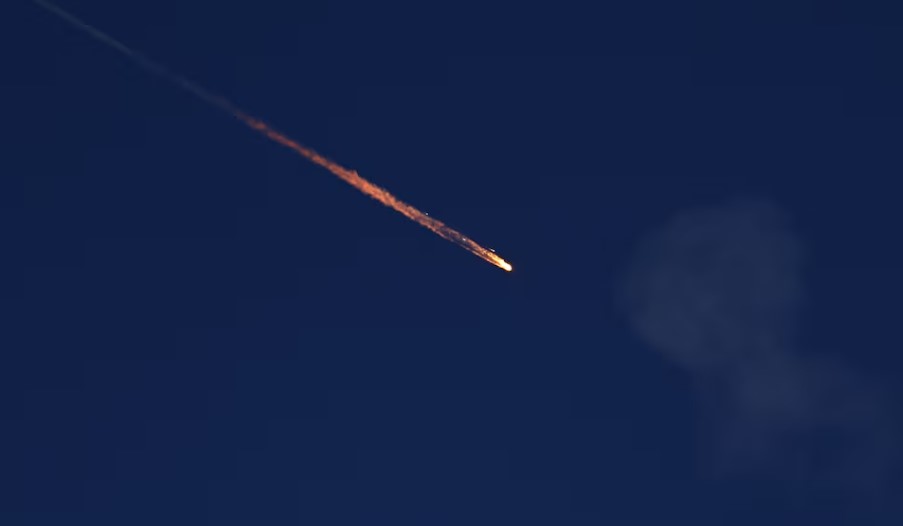Tel Aviv: In a major escalation in its shadow war with Iran, Israel announced the targeted killing of two high-ranking commanders of Iran’s Islamic Revolutionary Guard Corps (IRGC), both of whom played key roles in coordinating militant operations against the Jewish state.
Israeli Defense Minister Yoav Gallant confirmed that Saeed Izadi, a top strategist behind the deadly October 7, 2023, cross-border assault on Israel, was killed in a precision strike on an apartment in Qom, Iran. Gallant hailed the operation as a “notable success for Israeli intelligence and air capabilities,” describing Izadi as the financial and logistical architect who armed and funded Hamas ahead of the unprecedented attacks.
Izadi had long been a figure of international concern, appearing on sanctions lists maintained by both the United States and the United Kingdom. Despite this, Iranian state media remained silent on his death, reporting instead that five members of the Revolutionary Guards were killed in a separate Israeli strike on Khorramabad, without naming Izadi.
In a separate covert operation carried out overnight, Israeli forces eliminated another high-value target—Behnam Shahriari, commander of the elite Quds Force Unit 190. Shahriari, known for overseeing covert arms transfers to Hezbollah in Lebanon, Hamas in Gaza, and the Houthi rebels in Yemen, was reportedly killed while traveling by car over 1,000 kilometers from Israeli territory.
Israeli security sources revealed that Shahriari had been on the Mossad’s radar for over 15 years, with multiple attempts made to neutralize him since 2009. His death marks a significant blow to Iran's strategic weapons supply network in the region.
These high-profile assassinations underline Israel’s intensified campaign to dismantle Iran’s proxy war infrastructure, especially in light of the growing regional tensions and the threat of a broader conflict across the Middle East.
Israel Strikes Veteran Iranian Commander as Hostilities Escalate Across Middle East

The conflict between Israel and Iran reached a critical new stage on Saturday as Israel confirmed the targeted killing of a senior Iranian military figure, intensifying the cross-border hostilities amid deadlocked nuclear diplomacy and rising international concern.
Israeli Defense Minister Israel Katz announced that Saeed Izadi, head of the Quds Force’s Palestine Corps a key overseas unit of Iran’s Islamic Revolutionary Guard Corps (IRGC) was eliminated in a precision strike inside an apartment building in Qom, Iran. Katz described the mission as “a significant triumph for Israeli intelligence and the Air Force,” alleging that Izadi was a chief architect behind Iran’s support for Hamas and its role in the October 7, 2023, assault on Israel that triggered the ongoing Gaza war.
While Iranian state media confirmed a deadly Israeli attack in Qom, reporting the death of a teenager and injuries to two others, they did not officially acknowledge Izadi’s death. Separately, Iranian outlets reported that five IRGC members were killed in Israeli attacks on Khorramabad, and missiles also targeted the Isfahan nuclear complex, though no radiation leakage was detected.
In response, Israel launched a series of strikes across Iran, reportedly hitting missile storage and launch sites. Explosions were heard over Tel Aviv early Saturday morning as Israeli air defense systems intercepted incoming Iranian missiles. Sirens wailed across central Israel and parts of the West Bank, though no casualties were reported from the Iranian barrage.
Adding to the tension, Ali Shamkhani a high-ranking Iranian official and confidant of Supreme Leader Ayatollah Khamenei declared he had narrowly survived an Israeli strike. “Wounded but standing,” he said in a defiant message broadcast by state media.
Nuclear Standoff and Civilian Toll Mount
The military escalation coincides with a worsening nuclear impasse. Israel accuses Tehran of inching closer to weaponizing its nuclear program, a claim Iran vehemently denies, asserting its nuclear activities remain peaceful. However, Iran has retaliated forcefully, targeting both military and civilian Israeli sites. Israeli airstrikes have reportedly killed 639 individuals in Iran, including key military leaders and nuclear scientists, according to the U.S.-based Human Rights Activists News Agency.
Iran’s health minister, Mohammadreza Zafarqandi, accused Israel of striking three hospitals, killing two healthcare workers and a child, and damaging six ambulances. Meanwhile, an Iranian missile reportedly hit a hospital in Beersheba, southern Israel. Iran’s NOURNEWS named 15 air defense personnel killed in the conflict so far. On the Israeli side, 24 civilians have been confirmed killed by Iranian missile attacks.
Trump Warns of Imminent Nuclear Threat
U.S. President Donald Trump weighed in from New Jersey, warning that Iran could obtain a nuclear weapon "within weeks or months." He rejected intelligence assessments downplaying Iran’s current capability and accused his intelligence chief, Tulsi Gabbard, of underestimating the threat. Trump suggested that the U.S. may soon have to intervene but said he would delay his decision for “a week or two” to assess whether diplomacy remains viable.
At the same time, European foreign ministers hosted Iranian Foreign Minister Abbas Araqchi in Geneva in a last-ditch attempt to revive negotiations. However, Iran made it clear that talks with the U.S. were off the table until Israeli attacks cease. Trump dismissed Europe’s role in mediating the crisis, stating, “Iran doesn’t want to talk to Europe. They want to talk to us.”
Diplomatic Deadlock at the U.N.
The diplomatic standoff extended to the United Nations Security Council, where Israel’s envoy Danny Danon declared that Israel would continue military operations “until Iran’s nuclear capability is dismantled.” In response, Iran’s U.N. representative Amir Saeid Iravani urged the Council to take immediate action and expressed alarm at the possibility of direct U.S. involvement.
Russia and China joined the call for urgent de-escalation, but with hundreds of American citizens already fleeing Iran, and both nations hardening their positions, the prospects for peace appear increasingly remote.
A senior Iranian official speaking to Reuters said that while Tehran is willing to discuss limits on uranium enrichment, it will reject any condition that fully bars enrichment particularly while under siege by Israeli airstrikes.
With violence intensifying and diplomacy on life support, the Middle East teeters on the edge of a broader war that could soon draw in regional and global powers.